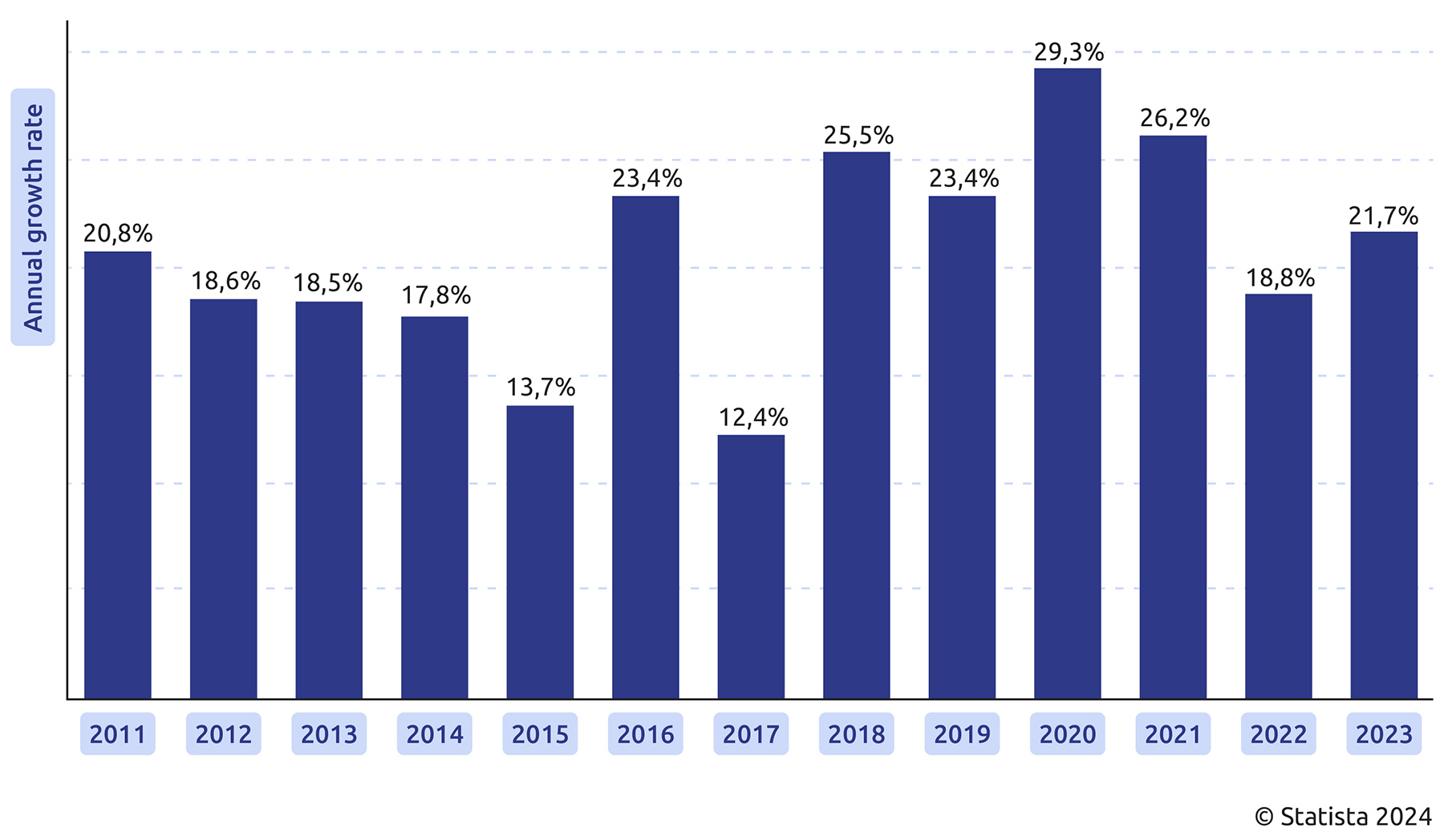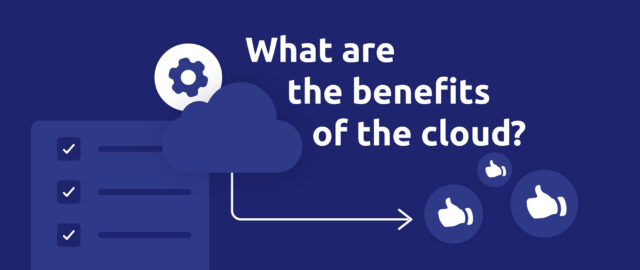Most companies use cloud software
Cloud adoption has never been higher. By 2023, 94% of businesses will be using at least 1 cloud software application (source: Flexera). We’re getting ever closer to 100%.
This is not a recent phenomenon. The cloud market has experienced uninterrupted growth for some twenty years, with an annual growth rate of over 20% in recent years (source: Statista).

Many software publishers are making the most of this trend, especially those in the customer relationship management (CRM) sector.
Salesforce, a trailblazer in this arena, launched the first cloud-based CRM back in the late 1990s. Today, Salesforce dominates the market with a value surpassing $250 billion.
So, why is cloud software so popular? It boils down to the benefits this distribution method offers. Let’s look at the six key advantages of cloud software:
Advantage 1: Lower costs
This is one of the benefits of the cloud that is often presented first, and rightly so. The adoption of cloud-based software can significantly reduce costs for businesses.
This cost reduction can be seen on several levels:
- Firstly, the use of cloud solutions eliminates hosting costs. Traditionally, companies had to purchase servers and storage systems to install the software. All this represented a significant initial investment. With the cloud, software publishers take care of hosting.
- Secondly, cloud software reduces software maintenance costs. Maintenance of physical infrastructure and software is handled directly by the cloud service provider. For companies, this means savings on labor costs.
- Thirdly, cloud solutions are billed on a subscription basis, often on a pay-per-use basis. You only pay for the resources you consume and the features you use. The subscription model allows you to spread your payments over time, reducing the initial investment.
There are several other advantages to the cloud, but this one alone is reason enough to favor the cloud over locally installed software.
Advantage 2: Better accessibility
Among the benefits of the cloud, accessibility is at the top of the list. Cloud software can be accessed at any time and from any device equipped with an Internet connection and a web browser, be it a computer, tablet or smartphone.
This is a major advantage for companies operating on several sites, for those encouraging telecommuting and for nomadic users.
This improved accessibility also facilitates collaboration between employees, whether in the same office or scattered across the globe.
For example, teams located in different time zones can work together on documents without having to email them every time they are modified. Cloud platforms offer real-time synchronization features that enable all users to see the latest versions of files.
Advantage 3: Automatic updates
Cloud software updates are automatic and managed by the software provider. This is one of the major differences with on-premise software, and one of the great benefits of the cloud.
Automatic update deployment means you can benefit from the latest features and modules without having to install them yourself. Technical problems and bugs are also automatically corrected without any intervention on your part.
In addition, :
- Improves your IT security by reducing the risk of vulnerabilities being exploited by malicious actors. If a vulnerability is discovered, it can be quickly corrected by the editor via an update distributed automatically to all cloud users, without them needing to intervene.
- Allows corporate IT teams to concentrate on other value-added tasks, rather than spending time planning and executing software updates. Delegating responsibility for updates to the software vendor enables companies to optimize their human resources. This echoes the first advantage of the cloud we mentioned.

Advantage 4: Greater flexibility
Cloud software adapts to changing business needs, and that’s one of the benefits of the cloud.
Cloud solutions enable resources to be rapidly scaled up as needs change. Need more resources? Simply upgrade your subscription package or temporarily increase your credit volume.
What’s more, cloud platforms are generally modular. You can choose the products (“modules”) and functions you need à la carte. This means you don’t have to pay for features you don’t need. Thanks to its flexible billing model, cloud software can adapt to your changing functional needs.
Advantage 5: Enhanced safety
The benefits of the cloud presented above are sometimes weighed against what is considered a disadvantage of the cloud: security. The reality is that cloud software is on average more secure than on-premise solutions.
Security is a major concern for all businesses. For this reason, cloud service providers are investing heavily in the deployment of advanced security systems, which are often out of reach for many companies due to their cost and complexity.
Cloud solutions generally benefit from advanced security protocols such as data encryption. Even if data is intercepted, encryption renders its content unusable.
In addition, security audits and penetration tests are regularly carried out to identify and correct any vulnerabilities.
Cloud service providers also use redundancy to guarantee data integrity. This consists of duplicating data on several servers and in several geographical zones to guarantee data accessibility even in the event of problems (natural disaster or cyber-attack).
Today, it’s commonplace to say that you’re more likely to fall victim to a cyber attack using software installed on your servers (which is not always very secure) than using cloud software offered by a reputable publisher.
Security is one of the benefits of the cloud.
The benefits of the cloud are numerous, and go a long way to explaining the high rate of adoption of this type of software by businesses.
Are you looking for a cloud platform for your outbound call campaigns? If you’d like to evaluate the benefits of the cloud for your contact center management, contact us to find out more about Diabolocom’s 100% cloud solutions.
Curious to know more about Diabolocom?



